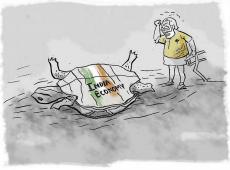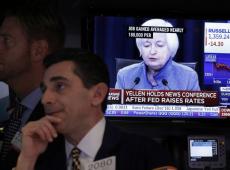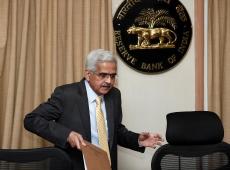Bank of England Holds Rates Amid High Inflation
By Rediff Money Desk, LONDON Feb 01, 2024 15:11
The Bank of England is expected to keep interest rates steady despite high inflation, signaling that rate cuts are not imminent. The decision comes as the UK economy faces challenges from high inflation and potential recession.
London, Feb 1 (AP) The Bank of England is expected to keep its main interest rate at near 16-year highs Thursday and indicate that lower borrowing costs are not imminent because inflation is stuck too high for comfort.
Like the US Federal Reserve on Wednesday, the UK central bank is not expected to steer financial markets into thinking that a rate cut is likely in the coming months, with cautious policy makers awaiting more evidence that inflation is rapidly heading down toward their target of 2 per cent.
In December, inflation in Britain unexpectedly rose to 4 per cent, an increase that tempered market expectations that the central bank would cut borrowing costs as soon as May.
Alongside its interest rate decision, the bank will be publishing its quarterly economic projections, and there will be particular interest on how soon it expects inflation to drop toward its goal.
On Wednesday, the Fed held rates steady but surprised financial markets with its cautious statement that it does not expect it will be appropriate to cut rates.
The Bank of England, like the Fed and other central banks around the world, raised interest rates aggressively from near zero to counter price rises first stoked by supply chain issues during the corona virus pandemic and then Russia's invasion of Ukraine, which pushed up food and energy costs.
Higher interest rates which cool the economy by making it more expensive to borrow, thereby bearing down on spending have contributed to bringing down inflation worldwide.
But those rate hikes the UK's key rate stands at 5.25 per cent also can bring their own pain, with many homeowners in Britain bracing for the fallout.
Unlike in the United States, for example, most homeowners in the UK lock in mortgage rates for only a few years. Those whose deals expire soon an estimated 2 million households over the coming year know that they face much higher borrowing costs because of the sharp rise in interest rates over the past couple of years. That's despite mortgage lenders reducing their lending rates on the assumption that the bank's main rate has peaked.
Though a predicted recession has not materialized over the past year, economic growth is muted as high rates hold people back from borrowing to buy houses or invest in businesses.
The backdrop is hardly ideal for the governing Conservative Party ahead of a general election in the coming year. Opinion polls point to a big victory for the main opposition Labour Party.
Like the US Federal Reserve on Wednesday, the UK central bank is not expected to steer financial markets into thinking that a rate cut is likely in the coming months, with cautious policy makers awaiting more evidence that inflation is rapidly heading down toward their target of 2 per cent.
In December, inflation in Britain unexpectedly rose to 4 per cent, an increase that tempered market expectations that the central bank would cut borrowing costs as soon as May.
Alongside its interest rate decision, the bank will be publishing its quarterly economic projections, and there will be particular interest on how soon it expects inflation to drop toward its goal.
On Wednesday, the Fed held rates steady but surprised financial markets with its cautious statement that it does not expect it will be appropriate to cut rates.
The Bank of England, like the Fed and other central banks around the world, raised interest rates aggressively from near zero to counter price rises first stoked by supply chain issues during the corona virus pandemic and then Russia's invasion of Ukraine, which pushed up food and energy costs.
Higher interest rates which cool the economy by making it more expensive to borrow, thereby bearing down on spending have contributed to bringing down inflation worldwide.
But those rate hikes the UK's key rate stands at 5.25 per cent also can bring their own pain, with many homeowners in Britain bracing for the fallout.
Unlike in the United States, for example, most homeowners in the UK lock in mortgage rates for only a few years. Those whose deals expire soon an estimated 2 million households over the coming year know that they face much higher borrowing costs because of the sharp rise in interest rates over the past couple of years. That's despite mortgage lenders reducing their lending rates on the assumption that the bank's main rate has peaked.
Though a predicted recession has not materialized over the past year, economic growth is muted as high rates hold people back from borrowing to buy houses or invest in businesses.
The backdrop is hardly ideal for the governing Conservative Party ahead of a general election in the coming year. Opinion polls point to a big victory for the main opposition Labour Party.
Read More On:
DISCLAIMER - This article is from a syndicated feed. The original source is responsible for accuracy, views & content ownership. Views expressed may not reflect those of rediff.com India Limited.
You May Like To Read
TODAY'S MOST TRADED COMPANIES
- Company Name
- Price
- Volume
- GTL Infrastructure
- 2.93 ( -4.87)
- 226206286
- IFL Enterprises
- 1.30 (+ 4.84)
- 81461564
- Vodafone Idea L
- 16.79 (+ 0.66)
- 67447398
- NCL Research
- 0.95 ( -4.04)
- 31996628
- Franklin Industries
- 3.73 (+ 3.32)
- 21511209
MORE NEWS

Navi Mumbai Airport ILS Signal Testing Begins
The Airports Authority of India (AAI) has begun ILS signal testing at the...

Air India VRS for Non-Flying Staff Ahead of...
Air India has announced a voluntary retirement scheme (VRS) and voluntary separation...
Fisher Groups Oppose WTO Fisheries Subsidy Talks
Small-scale fisher groups from India, Indonesia, and Bangladesh demand WTO keep...












 © 2024 Rediff.com India Limited. All rights reserved.
© 2024 Rediff.com India Limited. All rights reserved.